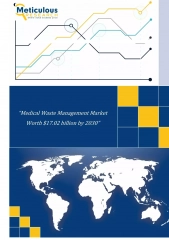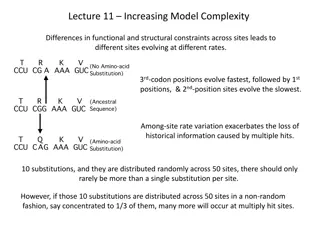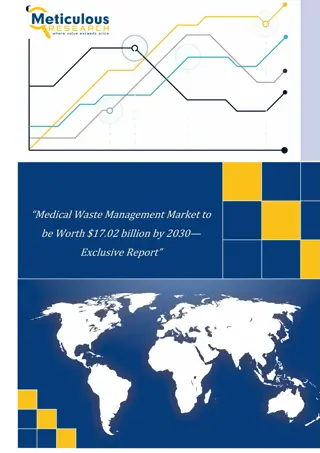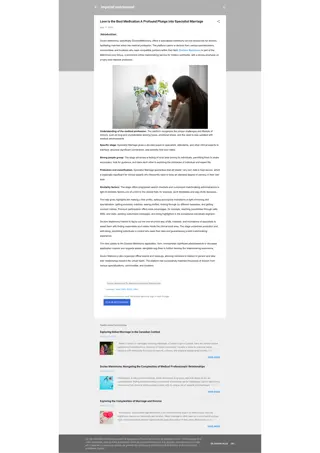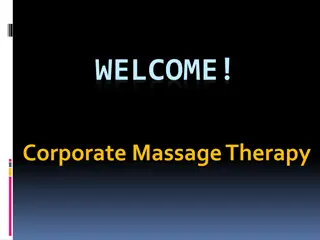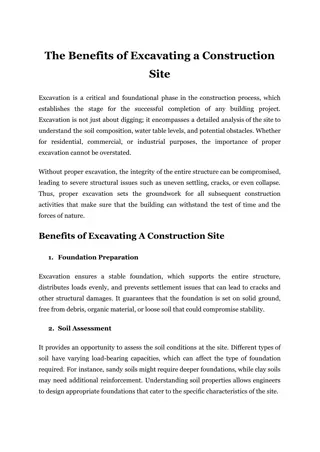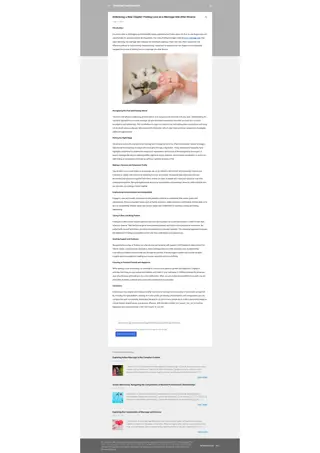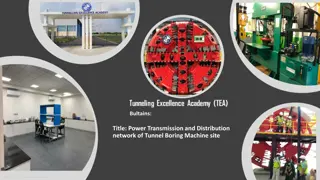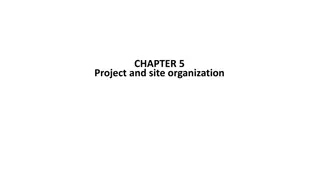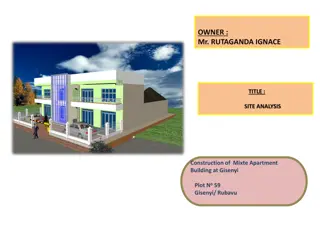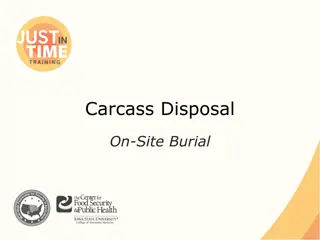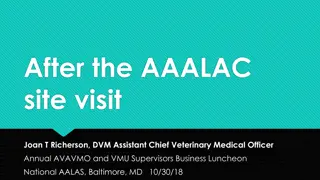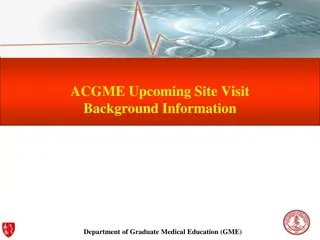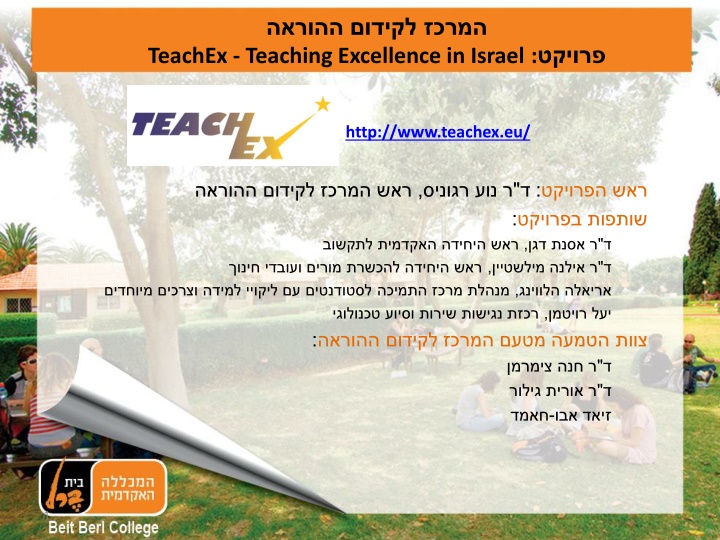
Enhancing Teaching Excellence in Israel through TeachEx Project
TeachEx project aims to increase teaching excellence capacity in Israeli HEIs by developing innovative teaching methods, training academic staff, and promoting collaboration with European partners. The project focuses on improving education quality, sustainability, and disseminating European teacher training experience.
Download Presentation

Please find below an Image/Link to download the presentation.
The content on the website is provided AS IS for your information and personal use only. It may not be sold, licensed, or shared on other websites without obtaining consent from the author. If you encounter any issues during the download, it is possible that the publisher has removed the file from their server.
You are allowed to download the files provided on this website for personal or commercial use, subject to the condition that they are used lawfully. All files are the property of their respective owners.
The content on the website is provided AS IS for your information and personal use only. It may not be sold, licensed, or shared on other websites without obtaining consent from the author.
E N D
Presentation Transcript
TeachEx - Teaching Excellence in Israel : http://www.teachex.eu/ , : : , , , " " " , : - " " 1
Project Main Goals Increase the teaching excellence capacity at our institutions! The TeachEx project is expected to contribute significantly to the professional academic staff development at the participating Israeli HEIs and be a reference in the improvement of teaching skills for the whole country. TeachEx will facilitate CTEs developing themselves as innovative dynamic frameworks through providing faculty with means to continue developing cutting edge creative teaching methods, based on sound educational principles where student unions will be an active actor as well. TeachEx will provide models of excellent teaching via faculty who have participated in the workshops and training sessions at the CTEs. These faculty will be exposed to new methods, such as integrating digital platforms with teaching and learning, skills for teaching and learning in diverse classrooms, using diversity as a resource in learning and in teaching and interactive and experiential teaching and learning skills.
Other specific goals of the project 1. To improve quality of education by contributing to university management in accordance with academic staff needs, connecting personal and civic fulfilment with the transferable skills required for a rapidly changing world. 2. To develop and deliver training materials and follow up activities for staff working at CTEs. 3. To create support structures in CTEs that outline conditions for project sustainability 4. To produce benchmark tools for teaching excellence that serve as medium and long term analysis. 5. To disseminate the European experience in teacher training and preparation of documents necessary for enhancing the interaction between the CTEs and other educational key stakeholders in IL.
TeachEx- Partners Beit Berl College Ben Gurion University Bezalel Gordon Academic College of Education IDC Herzliya Oranim Academic College of Education Council for higher education (Israel) National Union of Israeli Students Rijksuniversiteit Groningen, Nederland University College Cork, Ireland Glasgow Caledonian University, Scotland University of Brighton, UK University of Jagiellonski, Krakow EDEX university of Nicosia, Cyprus EURASHE, Brussels (European Association of Institutions in Higher Education The National Unions of Students in Europe
Project Time Line Year1: Development Year2: Run training programs Evaluating the developed tools, and the venues of training Year3: Accompanying the trained staff Evaluating the impact
Methodology Development: new and unique teaching methodologies appropriate for implementation in academia. developing of methodologies for assessing the staff developed teaching skills when trained by the developed methodologies, and the stuff training structure - WG2 Implementation: apply and use the developed teaching materials in staff training, according to the offered staff training structure WG3 Assessment: Testing the methodologies and the developed training materials success using different measures and tools - WG4
Project 5 Areas 1. Innovation in Active Teaching & Learning (new pedagogic approaches, learning environments, classroom techniques etc) 2. Internationalization of Education (application of learning outcomes , ECTS, DS in curriculum development) 3. Bridging the generation gap (Designing curriculum to meet the new student generation characteristics and learning strategies) 4. Managing Diversity in the Classroom Designing teaching methodologies that aim to give staff tools to develop diverse learning materials so as to meet different students learning styles, abilities, disabilities and multi- cultural backgrounds 5. Educational Technology - Blending learning, e-learning, mobile learning, etc. , - 6
1. Diversity and Accessible Instruction Addressing diversity in higher education is part of a global social trend. One of this project s main goals is to provide tools for faculty to advance their teaching-learning processes through discovering how to work with diversity in their classes. The faculty will become aware of their responsibility and accountability to diverse students. Faculty will become familiar with the principles of Universal Design in Learning (UDL), and learn how to use different teaching methods and materials in order to ensure that all students are engaged in the learning process. ,
2. Active/Reflective Teaching and Learning: Learning from Art and Design One of the qualities of art and design teaching learning processes is their active and reflective character. The module s main target is to provide tools for faculty to reflect in and on action, in order to map, conceptualize and share their tacit knowledge of teaching. Faculty will become aware of the practice of teaching as creative, active and meaningful. Faculty will develop their capacity for engaging in common ongoing and continuous professional development, gaining a sense of community and belonging. :
3. Mobile Learning Mobile Learning (M-Learning) refers to the use of mobile devices for teaching and learning, and is active, authentic, constructive, cooperative, personalized, and intentional. Use of mobile learning calls for faculty to emphasize learning outcomes and support their students learning processes, while constructing knowledge through appropriate pedagogy and technology. The TeachEx M-Learning training kit will help faculty gain skills for integrating mobile devices into their teaching, based on M-Learning s unique characteristics. The activities will focus on gathering and organizing data, creating digital products, reflecting, and constructing new knowledge. , ,
4. Lecturer as Producer In recent years, we see more and more lecturers in academia implementing new teaching methods utilizing recorded content. In this workshop, we will train faculty to become independent producers of simple explanatory videos, planning a presentation or script and using various self-production methods, including presentation- based videos, screen capture videos, and writing board videos.
5. Problem/Project-based learning (PBL) Active learning, centering on projects and dilemmas, involves learning by doing and collaboration of faculty and/or students towards the preparation of a project, aimed at solving a real-life problem. The students engage in independent inquiry learning. PBL offers students opportunities for meaningful exploration.
6. Learning Outcomes "Learning outcomes are statements of what a student should know, understand and be able to demonstrate after completion of a process of learning.
What are learning outcomes? Learning Outcomes are specific statements of what students should know and be able to do as a result of learning (Morss and Murray, 2005) Learning outcomes are statements of what is expected that a student will be able to DO as a result of a learning activity .(Jenkins and Unwin). A learning outcome is a statement of what a learner knows, understands and is able to do on completion of a learning process (European Qualifications Framework) Learning outcomes are explicit statements of what we want our students to know, understand or to be able to do as a result of completing our courses. (Univ. New South Wales, Australia) Learning outcomes are statements that specify what learners will know or be able to do as a result of a learning activity. Outcomes are usually expressed as knowledge, skills or attitudes . (American Association of Law Libraries). Learning outcomes are an explicit description of what a learner should know, understand and be able to do as a result of learning. (Learning and Teaching Institute, Sheffield Hallam University) 14 14
Working Definition Learning outcomes are statements of what a student should know, understand and be able to demonstrate after completion of a process of learning The learning activity could be, for example, a lecture, a module (short course) or an entire programme. Learning outcomes must not simply be a wish list of what a student is capable of doing on completion of the learning activity. Learning outcomes must be simply and clearly described. Learning outcomes must be capable of being validly assessed. 15 15


